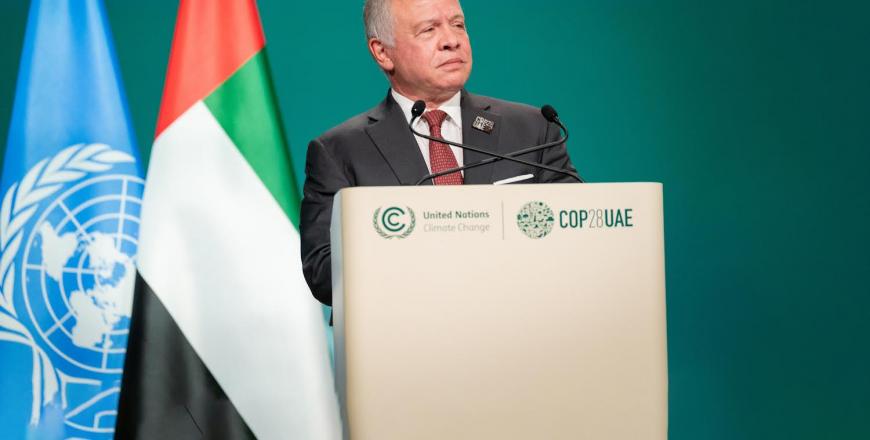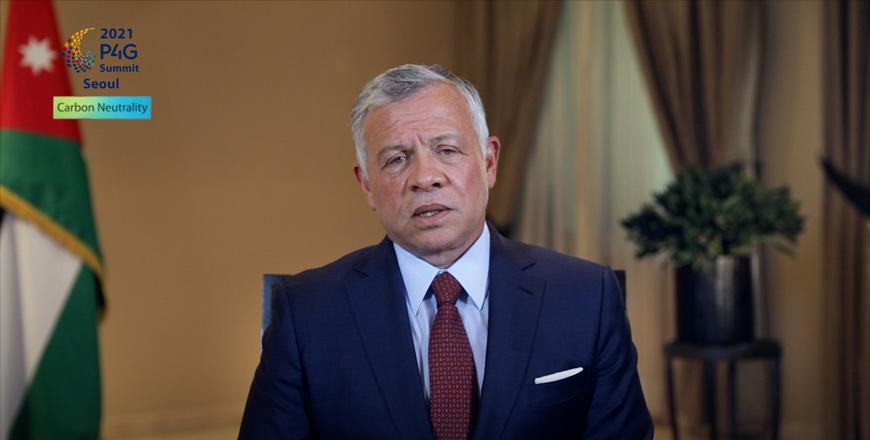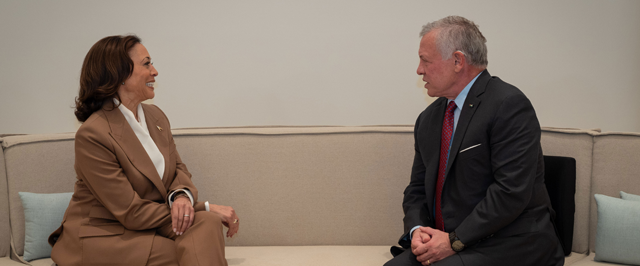You are here
King at COPO28 says climate change cannot be addressed in isolation from other tragedies, especially situation in Gaza
By JT - Dec 01,2023 - Last updated at Dec 01,2023

His Majesty King Abdullah delivers a speech at the United Nations Climate Change Conference #COP28, hosted by the United Arab Emirates
- His Majesty warns that the massive destruction of a relentless war in Gaza threatens more people, holds back progress toward a better global future
- King stresses the need for climate response to be inclusive of the most vulnerable
- King highlights Jordan’s key climate-related projects, including the National Water Conveyance Project, which will rely on renewable energy
AMMAN — His Majesty King Abdullah on Friday participated in the United Nations Climate Change Conference COP28, held in the United Arab Emirates.
King Abdullah said, “We cannot talk about climate change in isolation from the humanitarian tragedies unfolding around us”, pointing to the immediate threat to Palestinian’s lives and wellbeing, according to a Royal Court statement.
“In Gaza, where people are living with little clean water; and the bare minimum of food supplies, climate threats magnify the devastation of war”, His Majesty said.
The King stressed the need for climate response to be inclusive of the most vulnerable, including Palestinians that were severely impacted by the war on Gaza, populations around the world that are affected by conflict and poverty, and refugee families and host communities, in our region and beyond.
His Majesty said over 1.7 million Palestinians have been displaced from their homes, and tens of thousands have been injured or killed in the war on Gaza.
“Jordan has brought together all international partners to coordinate on mechanisms for the sustainable provision of food supplies to the Strip,” the King said.
His Majesty warned that “the massive destruction of a relentless war in Gaza threatens more people and holds back progress toward a better global future.
Highlighting Jordan’s key climate-related projects, the King said the National Water Conveyance Project in Jordan will rely on renewable energy.
“Our National Energy Strategy aims to generate 31 percent of electricity from renewables by 2030,” His Majesty noted.
Following is the full text of His Majesty’s speech:
“In the name of God, the Compassionate, the Merciful
My dear brother, Your Highness Sheikh Mohamed bin Zayed Al Nahyan,
Mr Secretary General,
Mr President,
I would like to first express my deep thanks and appreciation to my brother His Highness Sheikh Mohamed bin Zayed and the United Arab Emirates for successfully organising this international summit.
My friends:
This year’s Conference of the Parties must recognise, even more than ever, that we cannot talk about climate change in isolation from the humanitarian tragedies unfolding around us.
As we speak, the Palestinian people are facing an immediate threat to their lives and wellbeing. In Gaza, over 1.7 million Palestinians have been displaced from their homes. Tens of thousands have been injured or killed.
In a region already on the frontlines of climate change, the massive destruction of war makes the environmental threats of water scarcity and food insecurity even more severe.
In Gaza, where people are living with little clean water; and the bare minimum of food supplies, climate threats magnify the devastation of war.
So, my friends, as we meet here today to talk about inclusivity in climate response, let’s be inclusive of the most vulnerable:
Palestinians, severely impacted by the war on Gaza.
Populations around the world, affected by conflict and poverty.
And refugee families and host communities, in our region and beyond.
To address the real dangers of food insecurity in Gaza, Jordan has brought together all international partners to coordinate on mechanisms for the sustainable provision of food supplies to the Strip.
And as a country where refugees make up over a third of our population, we launched the Climate-Refugee Nexus last year. This global initiative prioritises climate-related support and investments for refugee-hosting nations. We are truly grateful for the 58 countries that have supported this initiative so far. But much more needs to be done.
My friends,
Jordan contributes a slim 0.06 per cent to global greenhouse gases, yet, we are greatly impacted by global climate change, which has caused threats to our scarce water resources, food sources and eco-diversity.
Today, Jordan’s most ambitious and vital projects relate to water. A major national water project envisions desalinating Red Sea water from the Gulf of Aqaba and channelling it to major population areas.
The National Water Conveyance Project will rely on renewable energy, a field where we have made significant strides. Our National Energy Strategy aims to generate 31 per cent of electricity from renewables by 2030. Hybrid and electric vehicles represent 18 per cent of our transport system.
In other climate action, research at the Aqaba Marine Park will explore the unique resilience of the Red Sea’s coral reefs to benefit the conservation and regeneration of coral reefs around the world. And I look forward to attending an event tomorrow on-board the OceanXplorer vessel to highlight this initiative.
Nationally, with a strong talent pool of young entrepreneurs and qualified engineers, we are pressing forward with solutions in climate-smart agriculture, water conservation, clean energy innovations, and more. And some of our innovators are showcasing their work here at COP28.
Jordan also launched its Green Finance Strategy, the first in the region, and we issued our first green bond earlier this year.
So, my friends,
Despite the challenges, Jordan has set an example in the region as a climate-action pioneer and is emerging as a green tech hub.
Yet, just as the impact of climate change does not take place in a vacuum, no country’s response succeeds alone.
The Global Stocktake has shown us that our world is still far behind in achieving the goals set by the Paris Agreement.
As we work to catch up on the lost time and progress, we cannot forget the most vulnerable.
Conflict-ridden communities, refugees, and developing countries must not be left alone to face a global problem. Nor can we stand by, as the massive destruction of a relentless war in Gaza threatens more people and holds back progress toward a better global future.
Current and future generations will hold us all accountable.
Allow me to conclude by expressing, once again, my thanks to my brother His Highness Sheikh Mohamed bin Zayed for the United Arab Emirates’ innovative role in galvanising international efforts to counter the impact of climate change on our world.
Thank you very much.”
The Jordanian delegation to the conference included Prime Minister Bisher Khasawneh, Director of the Office of His Majesty Jafar Hassan, and Environment Minister Muawieh Radaideh.
Related Articles
AMMAN — His Majesty King Abdullah on Sunday participated in the virtual P4G summit, organised by South Korea.The Partnering for Green Growth
AMMAN — His Majesty King Abdullah’s speech delivered at the United Nations Climate Change Conference COP27 in Sharm El Sheikh has put forwar
AMMAN — His Majesty King Abdullah stressed the need for the United States to play a leading role in pushing for a political horizon for the

















